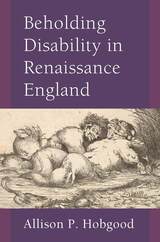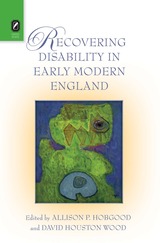2 books about Hobgood, Allison P.

Beholding Disability in Renaissance England
Allison P. Hobgood
University of Michigan Press, 2021
Human variation has always existed, though it has been conceived of and responded to variably. Beholding Disability in Renaissance England interprets sixteenth- and seventeenth-century literature to explore the fraught distinctiveness of human bodyminds and the deliberate ways they were constructed in early modernity as able, and not. Hobgood examines early modern disability, ableism, and disability gain, purposefully employing these contemporary concepts to make clear how disability has historically been disavowed—and avowed too. Thus, this book models how modern ideas and terms make the weight of the past more visible as it marks the present, and cultivates dialogue in which early modern and contemporary theoretical models are mutually informative.
Beholding Disability also uncovers crucial counterdiscourses circulating in the English Renaissance that opposed cultural fantasies of ability and had a keen sensibility toward non-normative embodiments. Hobgood reads impairments as varied as epilepsy, stuttering, disfigurement, deafness, chronic pain, blindness, and castration in order to understand not just powerful fictions of ability present during the Renaissance but also the somewhat paradoxical, surprising ways these ableist ideals provided creative fodder for many Renaissance writers and thinkers. Ultimately, Beholding Disability asks us to reconsider what we think we know about being human both in early modernity, and today.
Beholding Disability also uncovers crucial counterdiscourses circulating in the English Renaissance that opposed cultural fantasies of ability and had a keen sensibility toward non-normative embodiments. Hobgood reads impairments as varied as epilepsy, stuttering, disfigurement, deafness, chronic pain, blindness, and castration in order to understand not just powerful fictions of ability present during the Renaissance but also the somewhat paradoxical, surprising ways these ableist ideals provided creative fodder for many Renaissance writers and thinkers. Ultimately, Beholding Disability asks us to reconsider what we think we know about being human both in early modernity, and today.
[more]

Recovering Disability in Early Modern England
Allison P. Hobgood and David Houston Wood
The Ohio State University Press, 2013
While early modern selfhood has been explored during the last two decades via a series of historical identity studies involving class, race and ethnicity, and gender and sexuality, until very recently there has been little engagement with disability and disabled selves in sixteenth- and seventeenth-century England. This omission is especially problematic insofar as representations of disabled bodies and minds serve as some of the signature features in English Renaissance texts. Recovering Disability in Early Modern England explores how recent conversations about difference in the period have either overlooked or misidentified disability representations. It also presents early modern disability studies as a new theoretical lens that can reanimate scholarly dialogue about human variation and early modern subjectivities even as it motivates more politically invested classroom pedagogies. The ten essays in this collection range across genre, scope, and time, including examinations of real-life court dwarfs and dwarf narrators in Edmund Spenser’s poetry; disability in Aphra Behn’s assessment of gender and femininity; disability humor, Renaissance jest books, and cultural ideas about difference; madness in revenge tragedies; Spenserian allegory and impairment; the materiality of literary blindness; feigned disability in Jonsonian drama; political appropriation of Richard III in the postcommunist Czech Republic; the Book of Common Prayeras textual accommodation for cognitive disability; and Thomas Hobbes’s and John Locke’s inherently ableist conceptions of freedom and political citizenship.
[more]
READERS
Browse our collection.
PUBLISHERS
See BiblioVault's publisher services.
STUDENT SERVICES
Files for college accessibility offices.
UChicago Accessibility Resources
home | accessibility | search | about | contact us
BiblioVault ® 2001 - 2024
The University of Chicago Press









